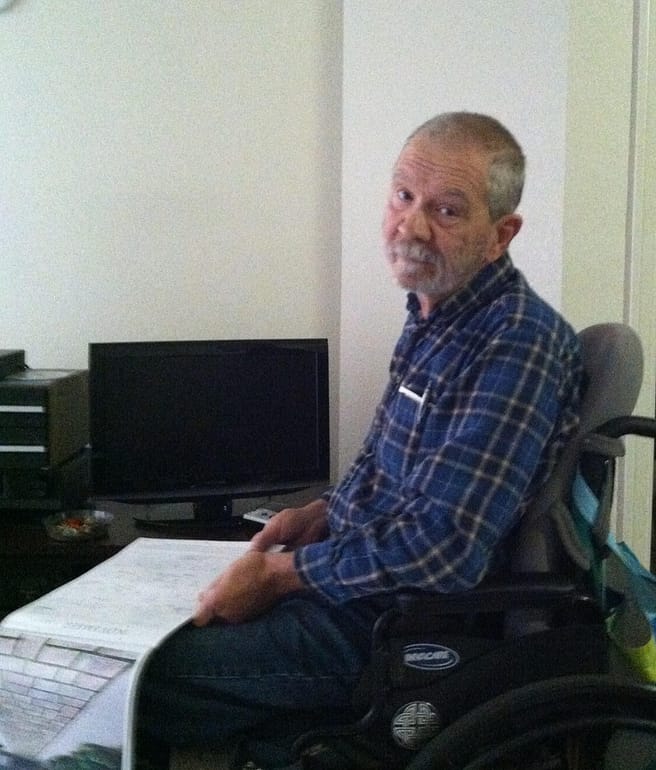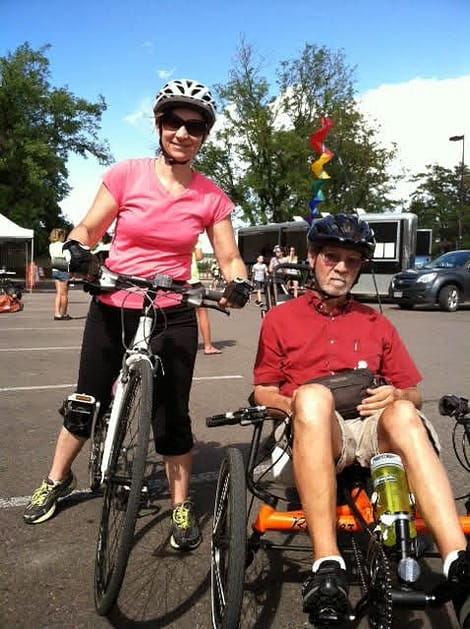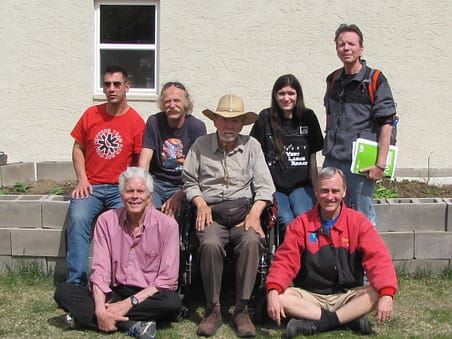Center for People With Disabilities (CPWD) is sad to acknowledge the passing of Ed Milewski in February 2023. Ed became part of the CPWD family after we assisted him in transitioning out of nursing care to living independently in the community.
Prior to living in Colorado, Ed lived in California. He was an avid cyclist, participating in multiple 100-mile bike races over the years. One day, during a training ride, he was hit by a car and lost mobility. He wound up in a nursing home in California, but was alone and without family. He transferred to nursing care in Colorado to be closer to his daughter, Kristine. One day, quite by chance, he found out about the opportunity to transition out of nursing care and begin living independently again.
Ed Milewski and his daughter Kristine are outside. Kristine is straddling a bike, wearing a helmet, sun glasses, a pink t-shirt and black capris. Ed is seated on an adapted orange bike, wearing tan shorts, a red shirt, sunglasses, and a helmet.
Ed and his daughter Kristine
“He was living at Boulder Manor,” explained Kristine Milewski, his daughter. “If it wasn’t for the brochure he found that was left there by CPWD, he could have easily spent the rest of his life in a nursing home.”
One of CPWD’s former staff, Tim Wheat, worked closely with Ed for months to put into place all the necessary arrangements needed for him to successfully transition out of nursing care. These included finding affordable and accessible housing, ensuring benefits were in place, securing appropriate home care, medication management, access to food, and many other tasks. Ed moved out of nursing care, and for the first time since his accident, started living independently again.
Ed was a regular participant of CPWD Peer Groups and was also very vocal about the value of transitions and other services for people with disabilities. “He always advocated for the nursing home transitions program, as well as systems advocacy relating to transition services,” said Aaron Pasterz, Independent Living Advisor at CPWD. “He participated in monthly committee meetings in Denver with the Healthcare Policy and Finance Department, sharing his experience, talking to lawmakers and bureaucrats, and stressing the importance of funding nursing home transitions for people with disabilities.”
In addition to championing independence for people with disabilities, Ed was passionate about the environment and considered himself a steward/spokesperson for the earth, Aaron said. “He used to say that the earth is the only one we’ve got, so we better take care of it. He promoted a cleaner and healthier environment.”
Kristine said that while Ed was very logical, he also had a big heart that showed through his actions. “Back in the day, he worked at a place that made dog products, and he always hired people with disabilities,” she said. “Later, he was the product manager for a company that made wheelchairs that were custom fitted to children with cerebral palsy, to accommodate their growth. Ultimately, after his accident, he ended up needing the same products and services.”
Ed Milewski with the CPWD Boulder Peer Group. Ed is seated in the middle in a wheelchair. he is wearing a tan shirt and brown pants, with a light tan hat. On the far left is a younger man wearing sunglasses and a red t-shirt. Next to him is an older gentleman with shoulder length blond hair and a mustache with sunglasses on his head, wearing a gray t-shirt with a graphic on it. Below in front is a gentlemen with white hair, seated on the ground, wearing a rose-colored button up shirt. To the right of Ed, seated on the ground, is a man wearing a red and black jacket with grey hair. Standing behind the man, directly next to Ed is a young woman wearing a black t-shirt with long dark hair. To her right is another man standing, wearing a black and gray fleece, holding a green notebook. He has brown hair.
Ed and the CPWD Boulder Peer Group in 2013
Above all, Ed was a realist with a good outlook. “He used to say, ‘It is what it is,’” Aaron recalled. “He always had a real positive attitude and accepted things the way they were, all the while doing everything he could to stay independent and advocate for others.”
We will miss Ed, and our condolences go out to his family and friends. He was truly an example of resilience and independence for many.





